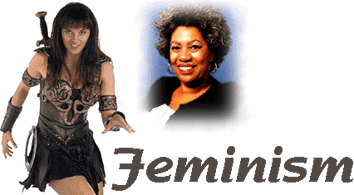

"Women . . . don't have penis envy; men have pussy envy."
--Valerie Solanas, "SCUM Manifesto"
"Lke Kafka's victim in "The Penal Colony," women have had to experience
cultural scripts in their lives by suffering them in their bodies. This
is why Maxine Hong Kingston writes so movingly about her resemblance to
the mythic woman warrior who went into battle scarred by the thin blades
which her parents literally used to write fine lines of script on her
body. For the artist, this sense that she is herself the text means that
there is little difference between her life and her art. The attraction
of women writers to personal forms of expression like letters,
autobiographies, confessional poetry, diaries, and journals points up the
effect of a life experienced as an art or an art experienced as a kind of
life, as does women's traditional interest in cosmetics, fashion, and
interior decorating.
--Susan Gubar, "'The Blank Page' and Female Creativity."
With the end of WWII, Rosie the Riveter was fired from her factory
job and told to return home to tend the house and children, and the seed
was sown for the feminist movement as we know it today. During the 1960s
feminism emerged out of the Civil Rights movement, as women began to
question why male civil rights leaders presided at meetings and set policy
while women always typed the notes. By the 1970s, women were noting that
the term "free love" does not mean "free access to women's bodies." With
the 1980s came the advent of "Power Feminism" as women started to break
down the separatist ideology of 70s feminism and began seeking power in
areas and with methods traditionally thought of as "masculine." The
1990's saw the rise of today's "Riot Grrl Feminism," which gives the power
feminism of the 80s a decidedly anti-establishment twist.
Throughout all of these ideological permutations, women have been
producing literature which reflects, contributes to, comments on, and
complicates the struggle against patriarchy/male domination which
generally defines the rubric of "feminism." From the
David-Lynch-meets-Betty-Crocker weirdness of Flannery O'Connor to the
stirringly poetic realism of Toni Morrison, feminist literature documents
the enormous plurality of women's lived experiences and subjectivities.
Links
General
Authors
-
Kathy Acker Website
Links to bio, bibliographies, and other Kathy Acker homepages and related
sites.
-
Margaret Atwood Links
Great page of links to other Atwood sites. Well-organized and annotated.
-
Erica Jong Website
Snazzy, official website with bio, novel exerpts, recent reviews, and
Erica's email address.
-
Maxine Hong Kingston Critical Reception
Bio, bibliography, and brief overview of critical reception of Kingston's
work, but no links to other pages.
-
Toni Morrison Website
Very graphics-heavy but has links to many other Toni Morrison sites.
-
Joyce Carol Oates Homepage
Great site with bio, bibliography, extensive critical bibliography, and
extracts, but no links to other Joyce Carol Oates sites.
-
Flannery O'Connor Homepage
Includes bio, bibliography, miscellaneous career information, and links to
other sites and special collections.
-
Sylvia Plath Website
Includes bio, bibliography, and links to other Sylvia Plath websites.
-
Susan Sontag Page
Brief bio and bibliography of primary sources. No links to other sites.
-
Amy Tan Website
Links to other Amy Tan articles and resources. Very graphics-heavy and
takes forever to load.
-
Alice Walker Website
Links to other Alice Walker articles and resources.
Magazines and Journals
Return to Home.
Return to Genres.



